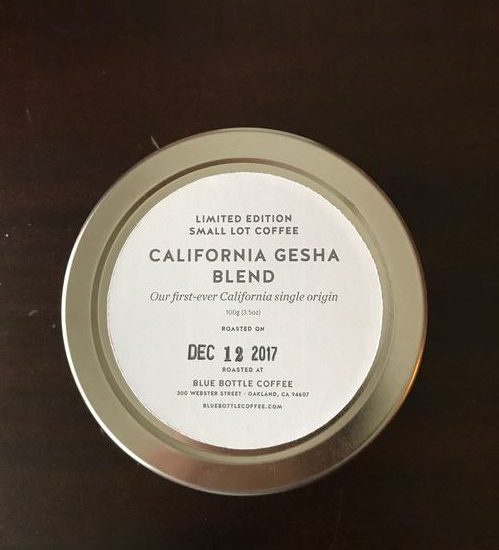While I’ll be writing this post up like a normal coffee review, this really feels like a bit of a historical event due to the beans themselves. First off, this is going to be a giant tease of sorts because this coffee was available for a very short window of time in December and that window has long since closed, so you won’t be able to buy this coffee until Blue Bottle chooses to make it available again… but keep your eyes open if you want a heads up the next time it becomes available (I found out through an email alert – manage your email preferences from Blue Bottle here).
Coffee needs pretty specific conditions in order to grow and thrive, and the closest areas to the continental U.S. known for producing coffee have been Hawai’i and Mexico — until now. Blue Bottle Coffee partnered up with Good Land Organics, a farm that is spearheading the California-grown coffee movement with their company Frinj Coffee. According to their website, Frinj has been selling 15 varietals that have been grown and roasted through Good Land Organics since 2012, but this distribution partnership with Blue Bottle marks (I believe) the first time this coffee has been widely available online to the public.
Let that sink in for a minute. Coffee grown in CALIFORNIA. This is a game-changer!! When I got the email from Blue Bottle about this limited run, I clicked on the link so fast, I didn’t even have time to blink! The price was quite steep ($65 for 100 grams of a Gesha blend, not even a full Gesha), but considering the uniquely rare nature of this coffee, I felt it was worth a try. Besides, I like supporting “local” businesses!
The coffee came beautifully presented, so I took a bunch of pictures:
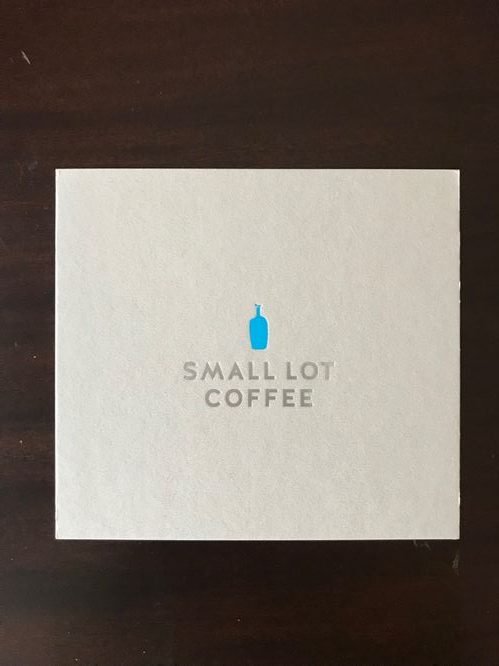
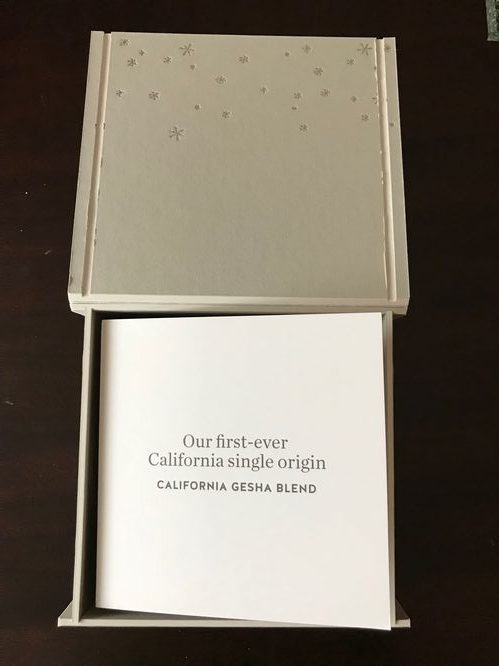
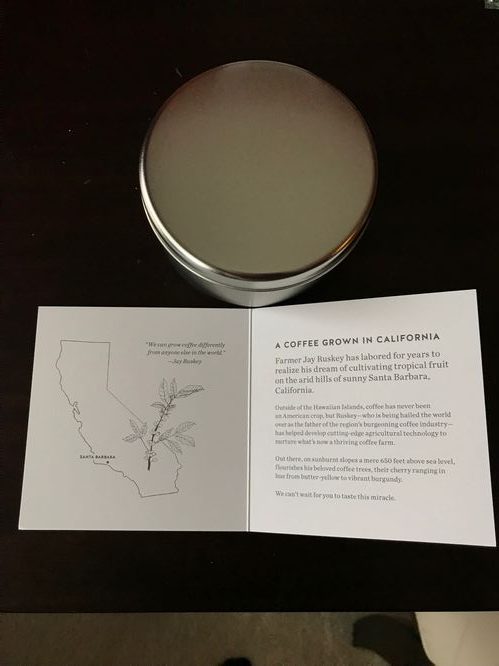
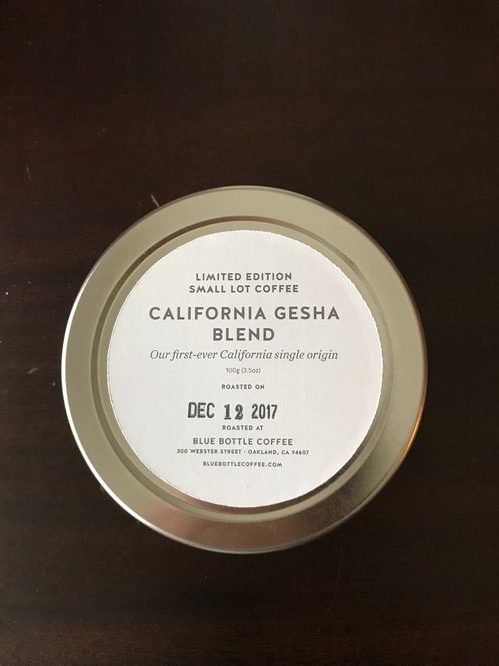
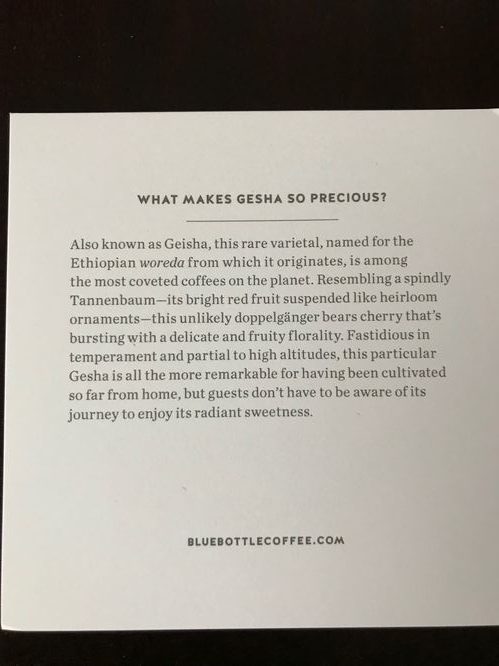
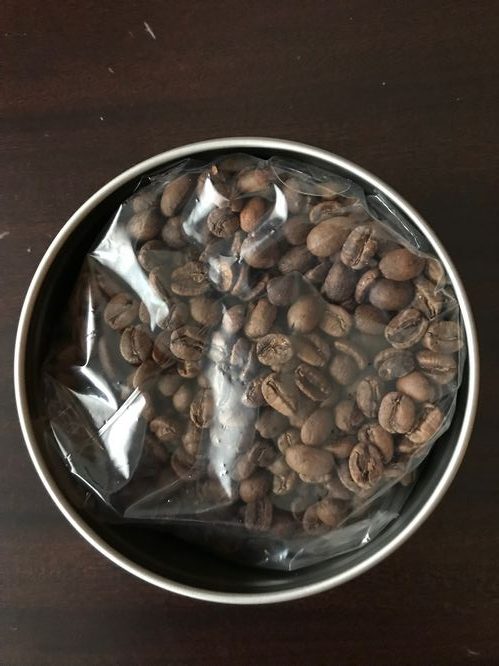
The coffee came loosely wrapped in this plastic bag, which was not sealed – I nearly lost some of the beans when I moved to remove the beans from the tin! Makes sense that they would want there to be an avenue for the air to escape as the beans de-gas, but fair warning, don’t move too quickly around these beans for fear of dropping any on the floor, not at this price point!
Whole bean: The best descriptor I have for the whole beans is that they smelled like the coffee beans that are around department store perfume counters, which the salespeople offer up to clear your senses between olfactory assaults. I’m not sure why my mind went there when I smelled these beans, but it made a bit more sense perhaps once I ground them up because once I did, the beans released a strong perfume-like aroma that was full of vibrant tropical notes. I smelled fruit punch.
French press: Considering how saturated the aroma was of the ground beans, I thought the flavor of the cup made in the french press was rather subtle. However, even though it wasn’t a flavor punch at the start, it definitely had a long, lingering finish… This was a rather creamy cup, and a bit of tartness revealed itself as it cooled. It tasted like green mango.
Chemex: I think the thick filter of the Chemex brought juicier notes out of this coffee; there was a pretty assertive flavor of tart raspberry that literally made my mouth water.
AeroPress: Really strong – I felt the flavors in this were turned up really loudly and I couldn’t pick anything in particular out – it was just a barrage of noise. Once I added a bit of water to the concentrate, it brought sweetness and balance to the cup.
V60: Bit of toasted marshmallow in this cup, along with red berries and citrus on the front. This was a really pleasing cup.
Summary: What a special experience this was to get to try coffee cultivated in my home state of California. Was it worth the steep price tag? I think it was, just for the novelty and the opportunity to try something that is so rare. I certainly wouldn’t be able to afford to order this on a regular basis, nor do I think it’s “better” than cheaper, more widely available coffees, but I did enjoy the flavor in this, and I think it’s super cool that we can now add California to the list of coffee-producing regions of the world.
From the roaster: jackfruit, magnolia, Turkish delight
This coffee is not currently available, but you can subscribe to Frinj Coffee’s site for updates on future releases (scroll down to find the form to subscribe).
Review conducted 6-8 days post-roast.
